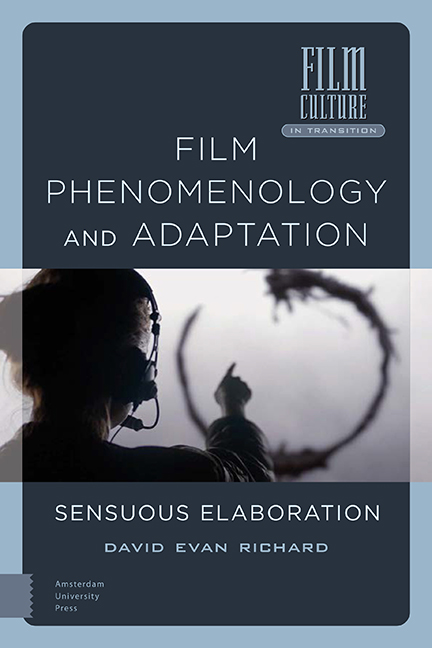Book contents
- Frontmatter
- Contents
- Acknowledgements
- List of Figures
- Introduction: A ‘Fleshly Dialogue’
- 1 Grave Visions: Visual Experience and Adaptation
- 2 Resonance and Reverberation: Sounding Out Screen Adaptation
- 3 Textural Analysis: Touching Adaptation
- 4 Textures of Imagination
- 5 (Re-)Mediating Memory’s Materiality
- Conclusion: Body Language
- Bibliography
- Filmography
- Index
5 - (Re-)Mediating Memory’s Materiality
Published online by Cambridge University Press: 27 May 2021
- Frontmatter
- Contents
- Acknowledgements
- List of Figures
- Introduction: A ‘Fleshly Dialogue’
- 1 Grave Visions: Visual Experience and Adaptation
- 2 Resonance and Reverberation: Sounding Out Screen Adaptation
- 3 Textural Analysis: Touching Adaptation
- 4 Textures of Imagination
- 5 (Re-)Mediating Memory’s Materiality
- Conclusion: Body Language
- Bibliography
- Filmography
- Index
Summary
Abstract
Adaptation criticism may begin as an act of memory, but while adaptation is a medium for memory it is also a medium of memory. This chapter considers adaptation as a form of memory work, paralleling adaptation's textual layering with memory's layering of experience. Adaptations can offer us experiential knowledge of the past—either fictional texts or a historical ‘truth’—or be antagonistic or self-reflexive about its formal remembrance. This chapter examines phenomenological approaches to the ‘tissue’ of memory and puts them in contact with two adaptations (one prestige, one arthouse), both concerned with the experience of marginalized bodies. In doing so, this chapter not only asks ‘what texts are remembered?’, or ‘who is remembered?’, but also questions ‘how are stories, identities, and lives remembered?’. In doing so, this chapter points to how an embodied approach to adaptation not only involves aesthetic appreciation but also ethical understanding.
Keywords: adaptation, memory, embodiment, queer, The Danish Girl (Tom Hooper, 2015), Poison (Todd Haynes, 1991)
Introduction: Tracing Memory's Role in Adaptation
Adaptation criticism begins as an act of memory. Equipped with intimate knowledge of its source material, the critic compares similarities and differences between characters, plot, and style, performing the kind of ‘conceptual flipping back and forth’ that Linda Hutcheon describes between the adaptation and their knowledge of its origins. Although the comparative approach has been dismissed as mere subjective impressionism, dangerously leading to emotional responses such as disappointment, contentment, or anger rather than dispassionate critical insight, Film Phenomenology and Adaptation: Sensuous Elaboration has followed Paisley Livingston's suggestion that the comparative approach is necessary to appreciate an adaptation ‘as an artistic achievement’, and that the comparative approach illuminates what has been adapted and how, providing a concrete basis to begin to answer the question of why.
But while adaptation is, on the one hand, a medium for memory it is also, on the other, a medium of memory, as adaptation can be thought of as a memory of an earlier work. And just like the performance of human memory, sometimes that memory is sharp, with the adaptation reproducing the features of its source with accurate detail. But, in other cases, an adaptation's textual memory might be more fuzzy, ‘forgetting’ elements of the original story or ‘recalling’ it differently by changing its tone or theme.
- Type
- Chapter
- Information
- Film Phenomenology and AdaptationSensuous Elaboration, pp. 161 - 202Publisher: Amsterdam University PressPrint publication year: 2021



